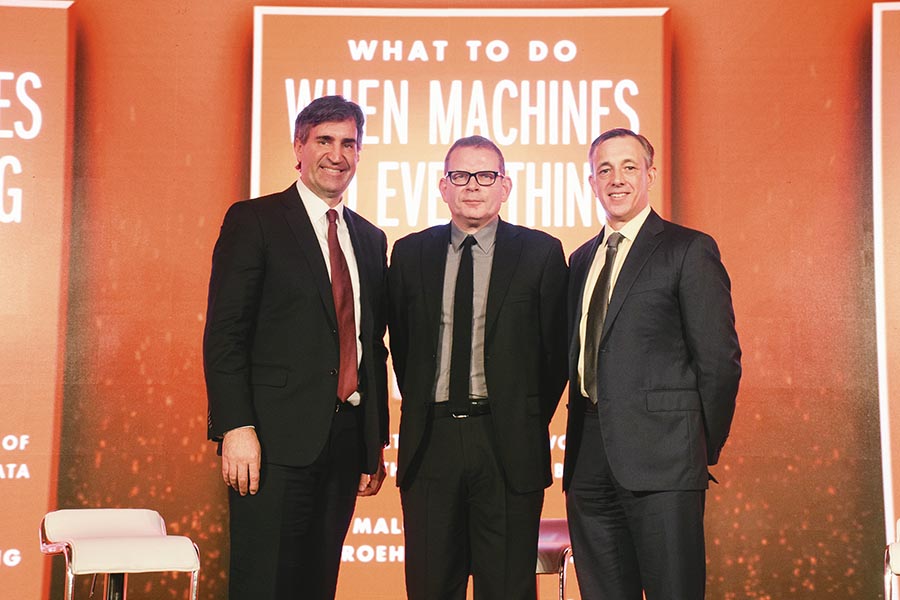In early 2014, three leaders at Cognizant Technology Solutions published Code Halos , in which they captured the idea that all of us, and all the objects around us, have data associated with us—they called it the ‘halo’—and making sense of that data opened up many interesting possibilities.
copyright by www.forbesindia.com
Malcolm Frank, Paul Roehrig and Ben Pring, the authors of Code Halos, have written a sequel of sorts in which they argue that Artificial Intelligence (AI) will be the means to understanding that halo, and for acting upon it. In their book, What To Do When Machines Do Everything: How To Get Ahead In A World Of AI, Algorithms, Bots And Big Data , they make the case for taking a pragmatist’s view on the rise of AI, instead of going to extremes.
Science-Fiction has become reality
It is very clear that even though people talked about AI for decades, it has finally become a reality, Frank tells Forbes India in a recent interview. The hype is about people imagining a dystopian future, say 20 or 30 years from now, in which machines rule humanity. People get concerned about what may happen with this singularity, which, loosely put, is when an AI will pass the test for being self-aware and trigger an explosive growth in tech that humans may not be able to control. People are getting caught up with “what’s going to happen when the machines can do everything, machines that don’t have morality and ethics and get caught up with science-fiction type issues?” he says. “The irony is, all of us are using Artificial Intelligence today in our daily lives—every time you go on your Facebook page or ask Siri a question.”
Not falling behind is key
That said, advances are taking place rapidly. Look at games that require strong application of the mind: When AlphaGo beat the champion Lee Sedol in Go last year, “that was a huge, huge leap”. One that was even more telling, Frank says, was the Libratus AI platform, on which Carnegie Mellon University and Pittsburgh Supercomputing collaborated. Libratus beat a poker champion this January. “It’s a game of bluffing,” Frank points out, and therefore such advances are “milestones that show how fast AI is evolving and it has profound implications for businesses”. The leading digital companies today—Facebook, Amazon or Google—have AI at the core of their business. But when we start to look at the implications in more traditional industries—banking, insurance, health care, retail—AI is nothing short of a “new machine, the machine that could drive the fourth industrial revolution,” he says.
read more – copyright by www.forbesindia.com


In early 2014, three leaders at Cognizant Technology Solutions published Code Halos , in which they captured the idea that all of us, and all the objects around us, have data associated with us—they called it the ‘halo’—and making sense of that data opened up many interesting possibilities.
copyright by www.forbesindia.com
Malcolm Frank, Paul Roehrig and Ben Pring, the authors of Code Halos, have written a sequel of sorts in which they argue that Artificial Intelligence (AI) will be the means to understanding that halo, and for acting upon it. In their book, What To Do When Machines Do Everything: How To Get Ahead In A World Of AI, Algorithms, Bots And Big Data , they make the case for taking a pragmatist’s view on the rise of AI, instead of going to extremes.
Science-Fiction has become reality
It is very clear that even though people talked about AI for decades, it has finally become a reality, Frank tells Forbes India in a recent interview. The hype is about people imagining a dystopian future, say 20 or 30 years from now, in which machines rule humanity. People get concerned about what may happen with this singularity, which, loosely put, is when an AI will pass the test for being self-aware and trigger an explosive growth in tech that humans may not be able to control. People are getting caught up with “what’s going to happen when the machines can do everything, machines that don’t have morality and ethics and get caught up with science-fiction type issues?” he says. “The irony is, all of us are using Artificial Intelligence today in our daily lives—every time you go on your Facebook page or ask Siri a question.”
Not falling behind is key
That said, advances are taking place rapidly. Look at games that require strong application of the mind: When AlphaGo beat the champion Lee Sedol in Go last year, “that was a huge, huge leap”. One that was even more telling, Frank says, was the Libratus AI platform, on which Carnegie Mellon University and Pittsburgh Supercomputing collaborated. Libratus beat a poker champion this January. “It’s a game of bluffing,” Frank points out, and therefore such advances are “milestones that show how fast AI is evolving and it has profound implications for businesses”. The leading digital companies today—Facebook, Amazon or Google—have AI at the core of their business. But when we start to look at the implications in more traditional industries—banking, insurance, health care, retail—AI is nothing short of a “new machine, the machine that could drive the fourth industrial revolution,” he says.
read more – copyright by www.forbesindia.com
Share this: